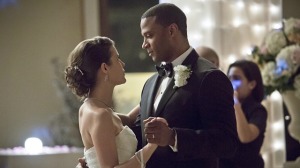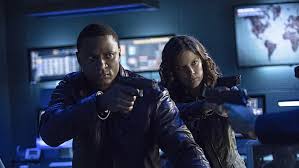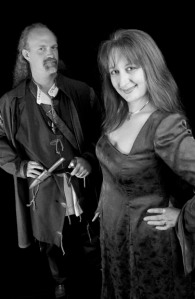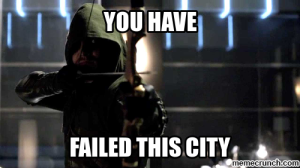I’m a fan of the Green Arrow comic book from way back. So is my husband. Consequently, we’re also fans of the current television series based on it, The CW Network’s Arrow. Yeah, it took a while to get started, and yeah, there are flaws and problems with it. But overall, it’s well done and offers a fresh take on many familiar characters from the DC Comics universe. (BTW, if anyone from the network happens to be reading this, Felicity and Ollie NEED to be together! She and Ray have NO chemistry!)
Anyway. *clears throat*
In a recent episode, the action split between the goings on in Starling City and a rescue mission headed by two of the supporting characters, John “Dig” Diggle and Lyla Holland. Diggle is one of my favorite characters in the show. He’s a genuinely good guy who has grown devoted to Oliver and his cause since they first came together as a traumatized and self-absorbed rich boy-man and his implacable bodyguard. I love Dig and Lyla as a couple both because they’re an outstanding example of a mixed race relationship on a popular television show and because they operate as partners. There’s little or no power inequity between them. Both are bad ass, with Army backgrounds and secret military connections. Both care for their daughter. They have their difficulties and differences, as every couple does. But for the most part, they resolve them through communication and compromise.
And yet.

In the episode in question, “Suicidal Tendencies,” John and Lyla got married (for the second time). Unfortunately for them, as they were about to depart on their honeymoon, Lyla’s boss summoned her for a covert mission leading members of the Suicide Squad into a fictional Middle Eastern country to resolve a hostage crisis. I’d like to reiterate: Lyla was the official Team Leader for this operation. Diggle, who had accompanied Lyla to ARGUS headquarters when she got the summons, decided to tag along and lend his (not inconsiderable) support. Well, to make a long story short, everything went kablooie when the hostage crisis turned out to be a con set up by the very senator the team was sent to rescue. And here’s the rub: when things blew up and the team got trapped in a hospital rigged to explode, Diggle automatically assumed command. EVEN THOUGH LYLA WAS THE OFFICIAL TEAM LEADER. He didn’t ask. He didn’t consult with her in any way. He just did it.

Now, you might offer several justifications for this. You might say since the mission turned out other than they thought, the original command structure didn’t hold. Or you might say Diggle was better suited to lead the changed operation because his experience on Team Arrow better suited him to situations that don’t go as planned and made him better able to improvise than someone with a strict military position. You might even say that Diggle is more of a major player than Lyla, so putting him in charge makes sense from a narrative standpoint.
Or you might say that Diggle–and the episode’s writers–took it for granted that when things go to hell, a man should be in control.
I’m ashamed to admit that I didn’t notice this at the time. It wasn’t until the next morning, when my husband said, “They did it again,” that I got it, and even then, he had to explain to me what he was talking about. (Ten points to Ravenclaw!) Since then, I’ve had a hard time not thinking about it. The thing is, Diggle KNOWS Lyla is competent–MORE than competent. She’s trained to handle doubtful situations. They’ve had each other’s backs over and over again. He knows what she can do. And he didn’t ask.
I mean, one line would have done it. “Hey, this mission has gone south; maybe I should take the lead.” That’s all he had to say. But he didn’t. Or he could have said, “Well, Lyla, you’re in charge. What do you want to do?” In which case, she might have replied with, “You’re better at improvising.” Or ANYTHING. Just acknowledge it!
It reminded me how insidious most sexism is. It goes on all the time, all around us, and we’re so inculcated in our sexist culture that we don’t notice. Sometimes I don’t notice even when it’s directed at me. It’s not until later, when I’m upset for no reason, or when I start to cry out of the blue, that I remember. Or my husband points it out, like he did the Arrow episode. Which is ironic, because I’m talking about the way our culture assumes men know better, think better, see better than women in almost every situation, and here’s a case where it’s true. My husband CAN see this shit better than I can, because it doesn’t endanger him. The microagressions of everyday sexism aren’t meant to reinforce a power structure where he’s inferior. If I had to acknowledge every single one in the moment, if every woman had to do that, I don’t know if it would be possible to go on living in this culture or on this planet. So mostly I, like many other women, don’t acknowledge the bulk of them. Not until later.
What does it look like in my life? Here’s a few examples culled from the many.
I used to be a DJ for the local community radio station. I developed an original Celtic Music show, “Whiskey in the Jar,” and both produced and hosted it for fifteen years, every Thursday night unless an illness totally incapacitated me. Sometimes I went in when I was sick, because I had a more difficult than average time persuading one of the other DJs to cover my slot. This is actually relevant. The usual excuse other DJs gave was that they weren’t familiar with the music. Which was pretty much a bullshit excuse, because any competent DJ could go in and pull music from the Celtic wall and come up with a decent two and a half hours by flinging random CDs at the players. They did it for shows in other genres, like Jazz and Bluegrass and New Age. Be that as it may, the other DJs acknowledged my expertise in the Celtic field in this weird way. They conceded that I knew what I was doing.
My show ran during the dinner hour, a shift from 6 – 9 PM. My husband was in the habit of coming to the station with me to bring me dinner and keep me company. THAT’S ALL HE DID. He’d been a DJ for a time as well, but during my show, I ran the board, I took calls, I chose the music and arranged the playlists. Yet, when we were out in public, even at some of the radio station functions, people inevitably referred to “Whiskey in the Jar” as “Your guys’s show.” They assumed my husband played more of a role than he did, sometimes to the point of engaging him in a discussion of the last show while I stood by with my jaw hanging open. I have a framed certificate on my wall that the station gave to me when I decided fifteen years was enough. It says the station proudly recognizes “Kele and Michael” for our outstanding contributions hosting “Whiskey in the Jar.” I was really glad to have my husband’s company on that journey, but I hardly consider his contribution to the show “outstanding.”
During my show’s run, the station engaged a nationally-known professional (male) photographer to shoot all the DJs for a series of photographs to be hung in the studio offices. I suggested to Michael that we pose in costume, and we had a great time. When the proofs came out, however, the photographer and I had a problem. He’d picked a particular shot as “The One” that represented the show best. I disagreed with him. We went back and forth for several emails, and finally he agreed to print and hang my choice in the show. At which he gave an interesting speech about how people need to trust an artist’s judgment and vision even if they don’t understand it. And his choice was the one that ended up in the show catalogue. Curious how that worked.


Do you see the difference here? It’s not that I dislike the artist’s choice. In fact, I love it. I have a framed copy hanging in my dining room, and we gave another to Michael’s parents. But in the photograph on the left, it’s clear that Michael is the dominant figure while I lean on him for support. He’s running the show. In the one on the right, I’m the dominant figure with Michael as a background presence. Which one better represents MY radio show? I think it’s pretty clear.
This isn’t a singular incident. Not long ago, I walked into the local print shop to get an estimate on bookmarks to use as promotional materials. I started talking to the woman behind the counter (one of the owners, someone we’ve known since we’ve lived in this town). She began showing me what they could do, how many bookmarks would fit on a page, explaining how their process worked. And then, Michael came in from parking the car. IMMEDIATELY, the printshop owner’s attention turned toward him, the man. She stopped talking to me in favor of talking to him, even though moments before she had assumed me competent to grasp her explanations. Even though I was the one who started the conversation, about materials I wanted to promote books I wrote, and my husband had simply driven the car.
Another time, shortly after I published my book of fairy tales, an acquaintance (a woman) purchased a copy from me. I asked her if she wanted me to sign it. She hesitated a minute, then said, “Can I get Michael to sign it?” Remember, I wrote every word of the book. I had arranged its publication, from the interior design to the cover art. And yet, this woman wanted my husband to autograph it. I asked her why and she said, “He’s really cute!” At the time, I laughed. The incident became a funny anecdote I won an “awful publishing stories” contest with at the next conference I attended. Looking back, though, it’s another in a long, long line of similar incidents. Times when my husband has been given credit for my successes, in which he only peripherally participated, if he participated at all.
I’m not angry at Michael for this. He does nothing to detract from me and nothing to claim the spotlight. Nothing except be a big, imposing, confident, reasonably attractive white man. Exactly the kind of man one would like to put in a position of authority, particularly as I’m extremely introverted and not at all confident in groups of people. Usually he catches the problem before I do, just as he did with that Arrow episode. If I could ask him to do one thing differently, it would be to address the situation when he sees it. Mostly he doesn’t because he doesn’t want to be rude. But at least he can see it.
Sexism isn’t always blatant. It’s not always the catcalls, the come-ons, the boss who asks the one woman in the office to pick up his dry cleaning and make his coffee, even when her qualifications are equal or better to those of the men. In fact, as damaging as those things are, they are less so than the little things that slip by us every day. The person who asks the man about his career and the woman about the pets or the kids. The tendency of certain fields to promote the work of men over that of women and People of Colour, even when the quality of the work and the subject matter is the same. It’s in the way we define normal and average to look like a white guy in a suit. And the fact is, women perpetuate it as much as men. Because we’ve learned that it’s the way things work, and because it seems rude to make a fuss. Because it’s really hard to confront nice people who honestly didn’t mean any harm, and because it’s really easy to think, “But maybe the quality of the work really IS different. Maybe men are simply better at these things.”
Like the writers of that Arrow episode, we remain unaware. And like them, we could solve many instances of it with a single line.
“Excuse me. She’s in charge.”


Hooray!
Hooray?
The Flash is full of subtle sexism which is absolutely killing me. My kids love The Flash. Grant Gustin seems like a nice guy. I want to like the show but….if they can’t reel in the sexism my head might explode. One example that killed me was the girl who busted her boyfriend out of prison. She drove to the prison. She rescued them–by flashing them into the getaway car with him in the drivers seat that somehow was adjusted to fit him while she was rescuing him. I think it was the same episode where Itis found herself needing to perform better at work, and Barry volunteered to help. That made my skin crawl, but then when he called to help, she was on a date and her career could wait. That shows have their flaws but have potential. I wish they’d include some better women writers and blow these shows out of the park.
You are so right about that. I LOVE The Flash as a show; it has some amazing writing and storytelling…all about Teh Menz. There’s essentially two women in the show, Caitlin and Iris, and neither of them is fully developed. Caitlin has multiple doctorates, yet most of her personal arc revolves around her relationship with Ronnie. And Iris is pretty much only a focus for Barry.